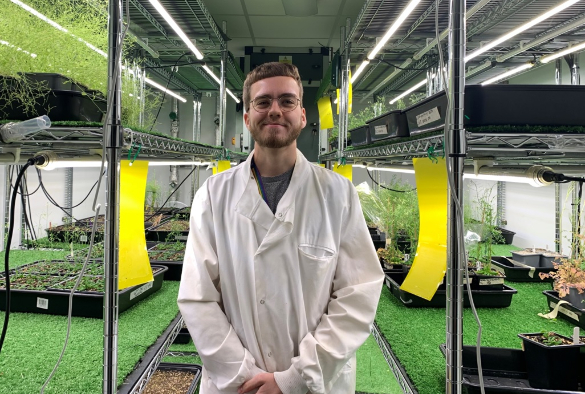
Jesse McCarthy is a second year PhD student in the Department of Biochemistry in the Institute of Systems, Molecular and Integrative Biology. His PhD is funded by the Biotechnology and Biological Sciences Research Council (BBSRC) as part of the BBSRC Newcastle-Liverpool-Durham Doctoral Training Partnership.
Food security – a growing problem
Producing enough food to meet the nutritional needs of a growing population is a major problem facing modern society. To meet these nutritional demands, we require novel crop varieties that can produce higher yields, while making more efficient use of resources, such as land, fertilisers and water, to decrease the environmental impact of agriculture. Fundamentally crop yields are determined by how much energy and nutrients can be absorbed / assimilated and converted to biomass. Photosynthesis is the process responsible for converting carbon dioxide (CO2) and water into chemical energy that can be used by plants and subsequently by other organisms. The efficiency and rate of photosynthesis has a direct impact on energy and tissue production, and therefore has a direct impact on yield. This makes this process an attractive target for crop improvement. As a result, many research groups are trying to improve photosynthesis in order to tackle the food security problems facing humanity.
Research of photosynthesis has traditionally focused on leaves, as the majority of photosynthetic activity occurs in these organs. However, a large body of research indicates that photosynthesis in other organs, including flowers and fruits, is important to provide resources for developing seeds, and can be more drought tolerant than photosynthesis in leaves. Understanding the regulation of photosynthesis genes in floral organs will be essential if we wish to manipulate photosynthesis in fruits, in an effort to improve yield, nutrition, and reduce the environmental impacts of agriculture.
My research
I’m in the second year of my PhD working in the Comparative Developmental Genetics lab, led by Dr Diarmuid Ó’Maoiléidigh. I’m interested in a gene called AGAMOUS (AG). AG is required for proper development of flowers and fruits and plays a role in regulating processes that support photosynthesis. I’m investigating this gene to try to improve our understanding of how development and photosynthesis in flowers and fruits is regulated. To do this I have been generating tools to be used for comparative developmental and functional genomics experiments, between two members of the mustard plant family, to determine what genes and processes AG is controlling. I am also trying to disrupt photosynthesis specifically in fruits, to help understand the contribution fruit photosynthesis makes to plant growth, seed yield and seed quality. I recently presented a poster about my research at the International Conference on Arabidopsis Research 2022 in Belfast and won the prize for best poster.
Outside of the lab
As an undergraduate I started boxing and have found it’s a great way to unwind after studying and working in the lab. In my second year of university, I was elected President of the Boxing Society and took on responsibilities of coaching and running of the society. I have since become two-time gold medallist in the British Universities and Colleges Sport (BUCS) boxing championships, represented the Home Counties in Guernsey and competed in America.
Future plans
As I am coming towards the end of the second year, I hope to finish generating my genomics tools and will get started on my experiments before the end of the year. My Doctoral Training Programme also includes the opportunity to complete a 3-month industrial placement, which I hope to complete at an agricultural technology company next year. I hope this will provide insight into the industrial research landscape and help me decide whether I want to pursue a career within, or outside of academia after completion of my PhD.